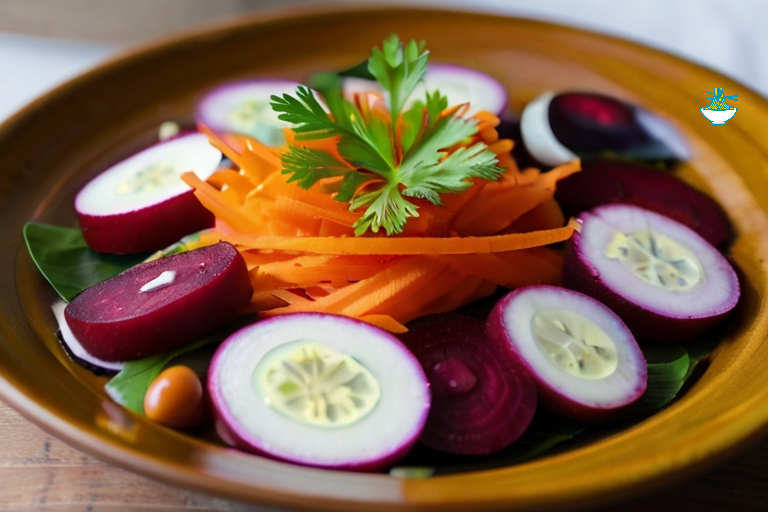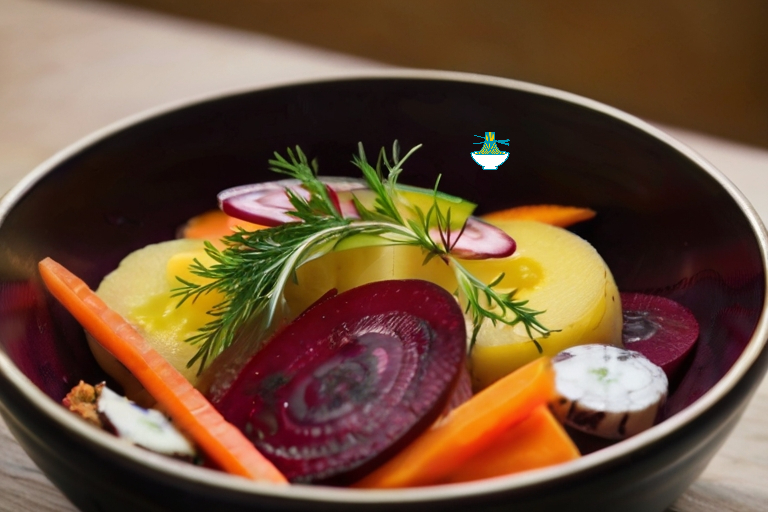Delve into the heart of Estonian cuisine with Rosolje, a traditional salad that encapsulates the flavors and history of this Baltic nation. Rosolje, meaning "beetroot salad" in Estonian, is a vibrant and nutritious dish that blends a medley of ingredients, including boiled potatoes, beets, carrots, pickles, and herring, all dressed in a tangy sour cream or mayonnaise-based dressing. This salad not only reflects the agricultural abundance of Estonia but also carries influences from neighboring countries, resulting in a harmonious fusion of flavors. Join us on a culinary journey to Estonia as we uncover the secrets behind this beloved dish, its cultural significance, and the techniques to recreate it in your own kitchen.
Here's a recipe for Rosolje, a traditional Estonian salad:
Ingredients:
- 2 medium-sized beets, cooked, peeled, and diced
- 2 medium-sized potatoes, cooked, peeled, and diced
- 2 medium-sized carrots, cooked, peeled, and diced
- 2-3 pickles, diced
- 1 small red onion, finely chopped
- 4-6 herring fillets, diced
- 1 cup sour cream or mayonnaise (adjust to taste)
- 2 tablespoons fresh dill, chopped
- Salt and pepper to taste
- Optional: boiled eggs for garnish

Instructions:
1- Begin by cooking the beets, potatoes, and carrots until tender. You can boil or roast them according to your preference. Once cooked, allow them to cool before peeling and dicing into small cubes.
2- In a large mixing bowl, combine the diced beets, potatoes, carrots, pickles, chopped onion, and diced herring.
3- In a separate small bowl, mix the sour cream or mayonnaise with fresh dill, salt, and pepper to make the dressing. Adjust the seasoning according to your taste.
4- Pour the dressing over the salad ingredients in the large mixing bowl and gently toss until everything is evenly coated.
5- Cover the bowl and refrigerate the Rosolje salad for at least an hour before serving to allow the flavors to meld together.
6- Once chilled, give the salad a final toss and taste for seasoning. Adjust if necessary.
7- Serve the Rosolje salad chilled, garnished with additional fresh dill and sliced boiled eggs if desired.
Enjoy this flavorful and nutritious Estonian dish as a side salad or a light meal on its own!
Nutritional Values:
Here's an approximate nutritional breakdown for the main ingredients used in Rosolje salad, per 100 grams:
Beets:
- Calories: 43 kcal
- Carbohydrates: 9.6 g
- Fiber: 2.8 g
- Protein: 1.6 g
- Fat: 0.2 g
benefits:
- Beets are rich in antioxidants, particularly betalains, which help reduce inflammation and protect against chronic diseases.
- They contain nitrates that may help improve blood flow and lower blood pressure.
- Beets are a good source of fiber, which aids digestion and promotes gut health.
Potatoes:
- Calories: 77 kcal
- Carbohydrates: 17.5 g
- Fiber: 1.3 g
- Protein: 2 g
- Fat: 0.1 g
benefits:
- Potatoes are a good source of vitamin C, potassium, and B vitamins, which support overall health and immune function.
- They provide carbohydrates for energy and fiber for digestive health.
- Potatoes contain antioxidants like flavonoids, which have been linked to reduced risk of chronic diseases.
Carrots:
- Calories: 41 kcal
- Carbohydrates: 9.6 g
- Fiber: 2.8 g
- Protein: 0.9 g
- Fat: 0.2 g
benefits:
- Carrots are rich in beta-carotene, which is converted into vitamin A in the body and essential for vision health.
- They are low in calories but high in fiber, making them a weight-friendly snack that promotes satiety.
- Carrots contain antioxidants like lutein and zeaxanthin, which protect against age-related eye diseases.
Pickles:
- Calories: 11 kcal
- Carbohydrates: 2.3 g
- Fiber: 0.6 g
- Protein: 0.4 g
- Fat: 0.1 g
benefits:
- Pickles are made from cucumbers, which are low in calories and a good source of hydration due to their high water content.
- They contain beneficial probiotics if fermented, which promote gut health and aid digestion.
- Pickles are low in fat and provide small amounts of essential nutrients like vitamin K and potassium.
Herring (canned, drained solids):
- Calories: 158 kcal
- Protein: 18.4 g
- Fat: 9 g
benefits:
- Herring is a fatty fish rich in omega-3 fatty acids, which support heart health by reducing inflammation and lowering triglyceride levels.
- It is a good source of high-quality protein, essential for muscle repair and growth.
- Herring contains vitamin D, selenium, and B vitamins, which contribute to overall health and well-being.
Sour Cream (regular, 18% fat):
- Calories: 193 kcal
- Carbohydrates: 4.2 g
- Protein: 2.1 g
- Fat: 18.6 g
benefits:
- Sour cream provides calcium and phosphorus, important minerals for bone health and strength.
- It contains probiotics that support gut health and aid in digestion.
- Sour cream adds creaminess and flavor to dishes while contributing some healthy fats to the diet.
These values are approximate and may vary based on factors such as cooking methods and specific brands of ingredients used. Keep in mind that the nutritional content of the salad will depend on the proportions of each ingredient used and the amount of dressing added.


Comments